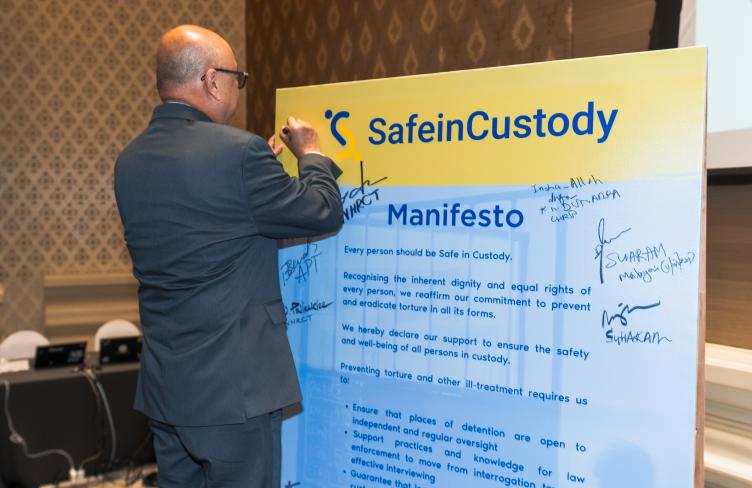
How to ensure the effective prevention of torture and other ill-treatment in Georgia’s places of custody? How can research inform efforts in this regard? Which strategies can be adopted to ensure greater implementation, by State authorities, of practical recommendations? These questions were the focus of APT’s recent mission to Tbilisi, which aimed to support the efforts of Georgia’s national mechanism to prevent torture to raise awareness of proven approaches to reduce the risks of torture in police custody, in particular the provision of key legal and procedural safeguards.
In July 2016, the groundbreaking independent research commissioned by the APT, 'Does Torture Prevention Work?' undoubtedly proved that “independently of the broader political factors, detention safeguards in practice have the highest torture prevention impact.” The research examined 16 countries across the globe, including Georgia, which represented an interesting case in light of the historical transformations the country went through during the research period from 1985-2014.
This chapter’s implications are all the more significant for the country as it unequivocally showed that, with the help of State authorities, torture prevention efforts do work in the country – as they did when “A first round of efforts (motivated by the country’s accession to the Council of Europe) strengthened procedural safeguards and judicial oversight of places of detention,” or when "the Public Defender’s Office and the Ministry of the Interior combined forces to reform the police service and monitor police detention.” ['Does Torture Prevention Work' p.416]
Hence, together with Georgia’s National Preventive Mechanism (NPM) – a unit created within the Public Defender’s Office in 2009 – the APT held a series of activities to address and reflect upon torture prevention strategies in police custody.
Public Debate at the Tbilisi State University
Jointly with Georgia’s Public Defender’s Office, the APT organised a public debate to explore the evolution of torture prevention in police custody in the past decades and discuss existing challenges and way forward, including regarding the provision of key safeguards in the early stages of detention.
Public panel on '30 Years of Preventing Torture in Georgia.' Left: Co-author of the Georgia chapter of the research 'Does Torture Prevention work?', Pr. Moris Shalikashvili introduced the discussion. Right: Nika Kvaratskhelia, Head of the Georgian NPM, speaks of current efforts to prevent torture with, at his sides, APT's Eva Csergö doing the moderation, Bakar Jikia, co-author of the Georgia chapter and Nona Kurdovanidze, GYLA's Deputy Chairperson.
The main findings of the research were discussed publicly and put into perspective by the Georgia country chapter researchers and two key practitioners of torture prevention in the country, the head of the NPM and the Deputy Chairperson of the NGO, Georgian Young Lawyers’ Association (GYLA). Panellists also gave in-depth insights into the evolution of torture prevention measures in the country since the publication of the research – in particular on the main challenges to the implementation of safeguards in police custody – and recommended ways forward. More on the speakers on the event’s flyer.
Workshop on follow-up to NPM recommendations
Building on the series of three workshops held in 2017 on the implementation of recommendations, the APT held a final, two-day workshop with the Georgian NPM on their recommendations related to police custody. The workshop addressed in particular the dialogue with authorities as a powerful tool to achieve change.
“This was a key stage in APT’s tailored and progressive support of the Georgian NPM,” said Ben Buckland, APT’s Independent Oversight Advisor, pleased that “the support we provided over the year contributed to strengthen the NPM’s mandate on torture prevention.”
Closed dialogue between Georgia’s NPM and its Ministry of Internal Affairs
Following-up on the workshop, a closed dialogue between the Georgian NPM and the Ministry of Internal Affairs of Georgia was held with participants from the APT.
“This represented a unique opportunity to thoroughly discuss the implementation of the 2017 NPM recommendations to the Ministry regarding police detention and explore concrete measures for implementation and change,” added Eva Csergö, APT’s Europe and Central Asia Programme Officer.
APT's delegation and members of Georgia's NPM in front of the Georgian Ministry of Internal Affairs.
For more information on the Georgian NPM, please consult our OPCAT Database.



